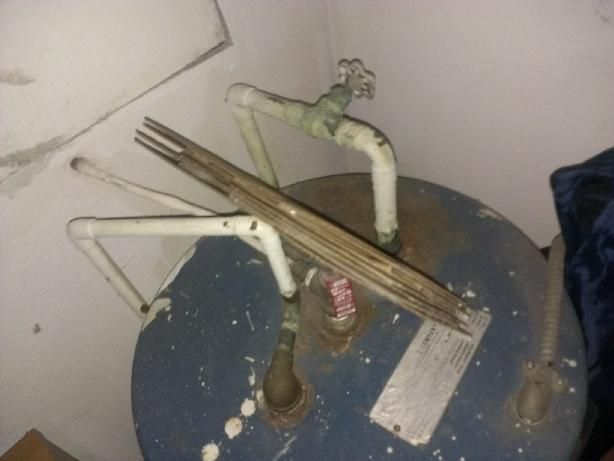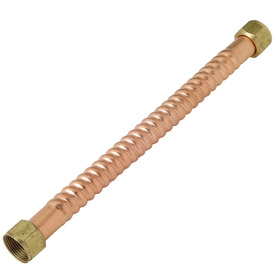 
Over 698,000 strictly plumbing related posts
Plumbing education, information, advice, help and suggestions are provided by some of the most experienced plumbers who wish to "give back" to society. Since 1996 we have been the best online (strictly) PLUMBING advice site. If you have questions about plumbing, toilets, sinks, faucets, drains, sewers, water filters, venting, water heating, showers, pumps, and other strictly PLUMBING related issues then you've come to the right place. Please refrain from asking or discussing legal questions, or pricing, or where to purchase products, or any business issues, or for contractor referrals, or any other questions or issues not specifically related to plumbing. Keep all posts positive and absolutely no advertising. Our site is completely free, without ads or pop-ups and we don't tract you. We absolutely do not sell your personal information. We are made possible by: 
|
|
Author:
PlumerDan (CA)
I use the stainless steel flex like the copper one but as... Of that thing w rubber inside..good luck and happy new year. 
|
|
Post Reply
|
|
|
Author:
hj (AZ)
I would use the corrugated copper ones, but they also make corrugated stainless steel. Don't forget to change the shut off valve also.
|
|
Post Reply
|
|
|
Author:
vic (CA)
Sum,
I feel that the two flexes that you are considering: the braided stainless on the outside with plastic on the inside flexes or the all copper flexes are "the best" way to go IF you are going to use flex connectors.
To me "the best" are all stainless corrugated flexes such as these top quality ones:

[www.plumbingsupply.com]
Why?
Water heaters are generally steel tanks with glass lining and so using "all stainless" between copper piping and a steel tank is superior to using using "all copper" flexes.
Also using braided stainless on the outside (not touching water) with having a plastic lining touching water and being close to the water heater (high heat) aren't even close to being "as good as" all stainless corrugated flexes. To me the braided stainless with plastics are "best" in constant flexing conditions.
IF I could only choose between the two different flexes you are showing my answer would depend on the quality of the water. If you have acidic and/or aggressive water I would not using an all copper flex. IF I knew for a fact that the braided stainless with plastic lining was made in the U.S. at that point I might reluctantly install it over the copper flex in lousy water conditions.
In my many years of having been in the plumbing trade I've seen many all copper flexes leak/split, have seen plenty of braided stainless with plastics leak/burst however have never seen an all stainless flex that we've sold leak (except for one where there was what appeared to be an electrical burn).
With all kinds of flexible connections all washers on all the different flex types can leak including on the all stainless connectors (it's one reason that we actually offer replacement washers specifically designed for high temp for our all stainless connectors).
Yes, most plumbers today still seem to tend to use all copper over all stainless. I recall maybe about 25 years I was promoting/pushing all stainless over all copper and even when we would offer the all stainless at the same price (making no profits so that plumbers would at least try all stainless) we had major resistance. Today I believe all stainless is still hard to find. Why? Marketing, distributions, less profits for the suppliers? I don't know. All that I know is that to me it doesn't take a rocket scientist to recognize that quality all stainless flexes is superior to using either all copper or plastic with braided stainless flex connectors and I've given in trying to figure out why the resistance. 
--
Regarding solid piping versus using flex connectors you'll get lots of differing opinions.
|
|
Post Reply
|
|
|
Author:
vic (CA)
Yup, Falcon Flex.
I see they show "since 1990." I believe I was one of their first distributors to believe in their product in 1990 and promote their flexes and I still feel the same way (my plumbing supply business was local in 1990, we started online in 1995 and closed locally in 2005).
Not many years after that there was one major plumbing manufacturer that started to compete and offer all stainless flexes however that company stopped offering them I believe due to lack of sales.
Why all copper flexes are still being used so much is beyond my comprehension other than saving a few pennies or maybe "I've always used copper flexes and overall they've worked fine for me and so no reason to try something else" or maybe it's a lot of "My local suppliers don't stock all stainless flexes."
---- ---- -----
Actually now that I think back about all of it, in probably 1996 or 1997 when the Internet hadn't been discovered by "the masses" yet and all was new to most people my company (besides being one of the first online plumbing suppliers) started creating websites for a number of plumbing reps, plumbing contractors (including one on Cooks Island in the Pacific) and plumbing related manufacturers (such as Commercial Enameling) and Falcon Flex was one of the mfrs we created a website for. I did theirs mainly because I believed in Gray Pender's all stainless flexes and I still do. A few years after that I decided that we no longer wished to create or maintain websites for anyone other than ourselves (it was like working for others which I didn't want to continue to do) and so I gave plenty of notice and then dropped all of the other websites. Yes, probably much more than you ever wanted to know. 
|
|
Post Reply
|
|
|
Author:
packy (MA)
we are required by code to install a vacuum breaker (typically a watts N36) in a tee on the cold supply. how are we supposed to do that with a flex connector?
most commonly we screw a 3/4 x 1/2 x 3/4 FFC tee onto the cold nipple and hard pipe from their.
now with the advent of pro press water heater replacements are done much faster and easier.
|
|
Post Reply
|
|
|
Author:
bernabeu (SC)
'hard pipe' with soldered copper tube
it has lasted decades and will continue into tomorrow so why 'downgrade' now?
if you 'must' use flex then stainless is the way to go
==============================================
"Measure Twice & Cut Once" - Retired U.A. Local 1 & 638
|
|
Post Reply
|
|
|
Author:
hj (AZ)
quote; how are we supposed to do that with a flex connector?
IF you don't know how to do it, you may be in the wrong business. There are at least 4 ways to do it, and probably even more if I wanted to think about it more than 2 minutes.
|
|
Post Reply
|
|
|
Author:
packy (MA)
were you ever a contestant on " name that tune "??
|
|
Post Reply
|
|
|
Author:
bernabeu (SC)
come on, packy, it's easy - just pretend it's gas and make a 'loop'

the above image, while actually found on the www, is NOT recommended as the flex is exposed to mechanical damage from feet, toys, etc. ~ the one behind the stove is not 'directly' exposed
who cares how it looks ? or whether it's good practice ?
except us dinosaurs
==============================================
"Measure Twice & Cut Once" - Retired U.A. Local 1 & 638
Edited 1 times.
|
|
Post Reply
|
|
|
Author:
hj (AZ)
quote; is NOT recommended as the flex is exposed to mechanical damage from feet, toys, etc. ~
YOu mean those MILLIONS of water heaters connected with flex lines are "improper"? Wow, that means we have a guaranteed income stream for years replacing them with "something".
|
|
Post Reply
|
|
|
Author:
bernabeu (SC)
no, the water piping may be connected with flex (if you must)
the gas valve (furnace or w/h) at or near floor level 'should not' be connected with a flex because of the possibly of mechanical damage due to its 'ground level'
since I used a gas valve pic I added the disclaimer
==============================================
"Measure Twice & Cut Once" - Retired U.A. Local 1 & 638
|
|
Post Reply
|
|
|
Author:
hj (AZ)
And the disclaimer was what I was addressing. I do NOT think I have seen, or connected, a water heater with anything other than a flex line since forever, or at least the 50s.
|
|
Post Reply
|
|
|
Author:
sum (FL)
vic, thanks! I have never seen these stainless steel ones.
Are they easier or harder to bend compared to the copper flex ones?
I assume dielectric unions are necessary to connect the copper lines to the WH connections which are not copper. By using stainless steel flex lines do I still need these dielectric unions?
I noticed these only come in 3/4" sizes, if my cold feed is 3/4" and the hot line is 1/2" I would use a 3/4" of this on the hot side then transition from 3/4" to 1/2"?
|
|
Post Reply
|
|
|
Author:
sum (FL)
so hj is this the first picture you have seen of a hard piped connection for a HWH?
I think with a hard piped connection you can't move the heater even a little just in case for whatever reason, like may be a key fell behind it or whatever. With a flex you have a bit of a wiggle room?
If I do hard pipe it I think I will put in two unions so I can take it apart and move it if necessary.
Edited 1 times.
|
|
Post Reply
|
|
|
Author:
vic (CA)
Regarding the corrugated all stainless water flexes, sum asked:
"Are they easier or harder to bend compared to the copper flex ones?"
Depending on the brand of the copper flexes, quality, etc I'd say "on average" are about the same as far as ease of flexing.
"I assume dielectric unions are necessary to connect the copper lines to the WH connections which are not copper. By using stainless steel flex lines do I still need these dielectric unions?"
Corrugated all stainless flexes connect exactly like all corrugated all copper flexes and have the same isolation bushing/fitting.
"I noticed these only come in 3/4" sizes, if my cold feed is 3/4" and the hot line is 1/2" I would use a 3/4" of this on the hot side then transition from 3/4" to 1/2"?"
Usually installing most brands of 3/4" x 1/2" bushings on the 1/2" nipple is all that you need (whether using all copper or all stainless flexes).
Not that it's related to your residential water heater however for some who might be reading this that do commercial work note that these corrugated all stainless flexes not only come in 3/4" they also come in 1", 1 1/4", 1 1/2" and 2"
The larger sizes are great for water softeners and commercial work (wow, my comments are starting to sound like an ad to me which is not what I had originally intended this to be however in a sense I suppose it has become that. I truly believe in these corrugated all stainless flexes by Falcon and if you look at all of my thousands of comments these many years I rarely endorse a specific brand or product).
[www.plumbingsupply.com]
|
|
Post Reply
|
|
|
Author:
bernabeu (SC)
hj,
there are still jurisdictions which PROHIBIT accessible flexible connections to gas valves in locations where they could be damaged mechanically - ie. near the floor in 'trafficked' areas
(behind the range is acceptable as it could not be 'kicked')
New York City and Newburg, New York are personally known examples.
? What would best practice dictate ?
DOH
==============================================
"Measure Twice & Cut Once" - Retired U.A. Local 1 & 638
|
|
Post Reply
|
|
|
Author:
hj (AZ)
Both the copper and stainless steel ones have dielectric "unions" on the ends that connect to pipe threads.
|
|
Post Reply
|
|
|
Author:
hj (AZ)
quote; so hj is this the first picture you have seen of a hard piped connection for a HWH?
You are kidding, right? OF COURSE NOT, in fact I have hard piped MANY water heaters, both the water and gas lines, but I was addressing his statement that hard piped gas lines are the ONLY way to do it, even though millions, upon millions, of heater DO have a flexible gas supply line.
|
|
Post Reply
|
|
|
Author:
hj (AZ)
They also come in 1" x 3/4" which are also handy sometimes.
|
|
Post Reply
|
Please note:
- Inappropriate messages or blatant advertising will be deleted. We cannot be held responsible for bad or inadequate advice.
- Plbg.com has no control over external content that may be linked to from messages posted here. Please follow external links with caution.
- Plbg.com is strictly for the exchange of plumbing related advice and NOT to ask about pricing/costs, nor where to find a product (try Google), nor how to operate or promote a business, nor for ethics (law) and the like questions.
- Plbg.com is also not a place to ask radiant heating (try HeatingHelp.com), electrical or even general construction type questions. We are exclusively for plumbing questions.
Search for plumbing parts on our sponsor's site:
Special thanks to our sponsor:

|





 Use flex copper lines like these:
Use flex copper lines like these:




